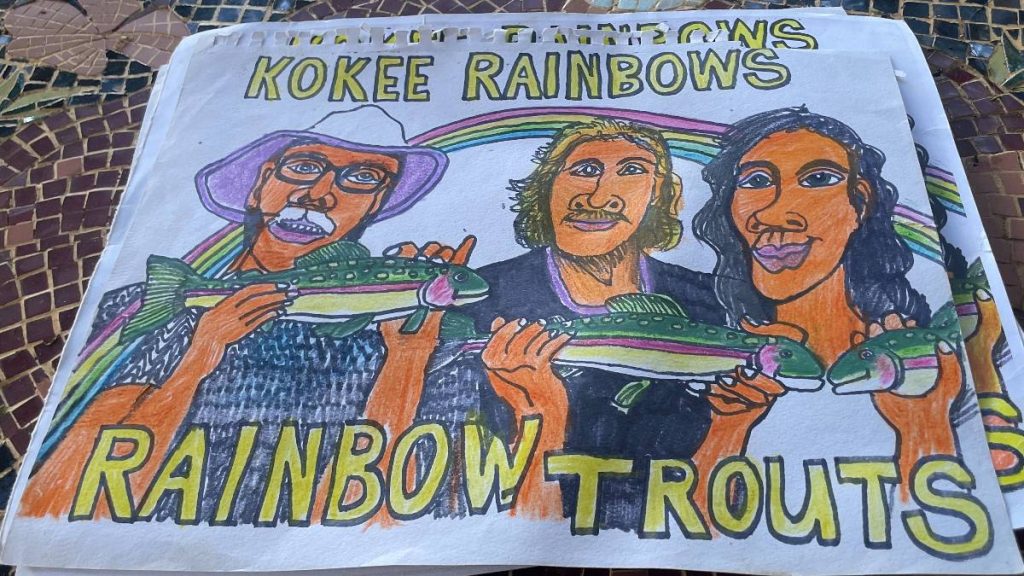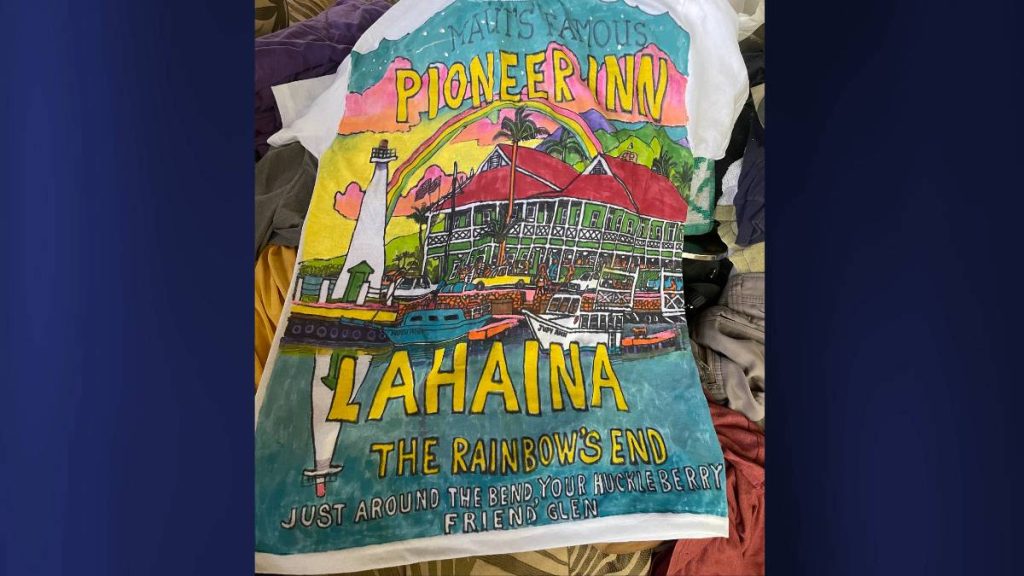Deprecated: stripslashes(): Passing null to parameter #1 ($string) of type string is deprecated in /mnt/efs/html/wp-content/plugins/template-scripts/src/AuthorBios/Frontend.php on line 129
Colleague alleges jailed artist’s letter for Kauaʻi councilman was a complaint, not a threat
Over a month after local artist Glen Gruenhagen was handed a year-long jail sentence for allegedly threatening Councilman Billy DeCosta through a handmade poster in January, a recently obtained record of a heated private meeting among county staff reveals the man had come to the Historic County Building in Lihuʻe begging for help, claiming DeCosta had been harassing him in Kōkeʻe for years.
“He was frightened, and he was blown away that the person who terrified him for years, this is his story, had become an elected official,” said Councilwoman Felicia Cowden during the Jan. 18 executive session, the day before Gruenhagen’s arrest on Jan. 19.
Cowden, who had spoken with Gruenhagen at length before leaving the document on DeCosta’s desk herself on Jan. 12, said she found Gruenhagen’s story credible because of her own negative experiences with the councilman.
“I believed Glen’s story right away because it felt so much like what I’ve endured myself,” she said in a recent interview.
DeCosta declined to be interviewed about the case but adamantly denied the allegations during the executive session.
The minutes of the closed-door meeting also reveal a lack of a presumption of innocence for Gruenhagen by council members, particularly by County Council Chair Mel Rapozo, who made multiple disparaging remarks about the man amid an ongoing investigation.
Additionally, separate interviews with lawyers, including the legal opinion of a third-party attorney and a follow-up interview with the public defender, continue to raise questions about the handling and sentencing of the case.
Outside attorney voices concerns
As previously reported, Gruenhagen was arrested on first-degree terroristic threatening charges a week after bringing a document, described by police as a “threatening letter,” to the Historic County Building in Lihuʻe on Jan. 12.
Despite two out of three doctors reporting he was unfit to proceed, Gruenhagen continued with a plea deal under Fifth Circuit Court Judge Kathleen Watanabe on May 7 that sentenced him to a year in jail for the lesser charge of terroristic threatening in the second degree.
As read out in court by Deputy Prosecuting Attorney Lawrence Sousie and agreed with by Public Defender John Calma, the note left on DeCosta’s desk “threatened beyond word to cause bodily injury to another in reckless disregard of the risk of terrorizing another.”

The note reads: “Old Dogs Rule. Councilman ‘Billy De Goat’ hunted me down, like a wild animal, in Kokeʻe for 25 years and couldn’t catch me! Cuz, I own a dog! Run your dog, not your mouth! Billy hunted becomes hunter it’s election year! Once you’ve hunted humans there’s no other game! Let ‘em know who’s boss! Old Dogs Rule.”
Kauaʻi Now recently consulted with Megan Kau, a former deputy prosecuting attorney and current defense attorney in Honolulu, for her legal expertise as a lawyer with no involvement in the case.
“In my opinion, as a former deputy, I don’t think that this threat is a real threat and it’s imminent,” she stated, having noted that her assessment was an incomplete review made without access to police reports, the victim, or records.
Kau also questioned the reasoning for the public defender to proceed with a plea deal even though two out of three doctors had found Gruenhagen unfit to proceed. “That’s very concerning to me,” she said.
She believes Gruenhagen “would have had a very strong defense” in a trial given the document’s ambiguity and the fact that it was a council member, not Gruenhagen, who had left the letter on the desk.
“The note itself is difficult to understand. It’s not grammatically correct,” Kaua said. She stated that if a threat is not intelligible or ambiguous, it is not a direct threat, and a defendant can’t be convicted of terroristic threatening.
Gruenhagen was frightened, asking for help
Kau had provided her opinion without having reviewed the minutes of an executive session, recently provided to Kauaʻi Now by the County Attorney’s Office.
The roughly one-hour-long private meeting immediately followed the public emergency meeting held by Council Chair Rapozo on Jan. 18 because of the incident.

Cowden, the only council member to interact with Gruenhagen, detailed their Jan. 12 conversation, saying it began with him banging on a door outside staff offices.
She described Gruenhagen as a gentle artist with solid painting skills who is “not totally normal” and “not that sound.” She said she has known him for years and recognized that he is currently unhoused.
Cowden said she opened the door and saw Gruenhagen visibly upset. She mentioned he had visited the building at least once before and left his contact information with a secretary but nobody had called him back.
Cowden apologized for not having contacted him and then invited him into her office.

Upon entering her office, Gruenhagen told her that he wanted to speak to “Billy’s boss” because he was worried about being killed by DeCosta’s dogs in Kōkeʻe.
“He was shaking and he was upset,” Cowden stated.
Cowden said Gruenhagen told her that DeCosta “would send his hunting dogs after me and treat me like a wild animal and it is terrifying.”
Gruenhagen then showed her the document and asked for her to give it to DeCosta’s boss.
Cowden continued, saying, he said, “I do not think he should have this job. It is an election year. He should not have this job if he is sending his hunting dogs after a person.”
Gruenhagen reportedly told her the issue has been ongoing for years.
Cowden said she advised Gruenhagen to report the issue to the police, but she took the document and told him she would “try to take care of this.”
Having not seen the situation as a threat, Cowden soon after placed the document on DeCosta’s desk without notifying anyone of the incident.
“This person is not the type of person that can email. This is his email,” Cowden said.
ʻI will do my best to make sure that man goes behind bars’
Cowden faced criticism from Rapozo and DeCosta, who came across the note on his desk four days later on Jan. 16.
The other council members, KipuKai Kualiʻi, Bernard Carvalho, Ross Kagawa, and Addison Bulosan, also made various statements in agreement, saying they viewed the note as a threat and would have notified the police or Rapozo.
Following Cowden’s story, Rapozo called the document, and specifically the line “hunted becomes hunter,” a threat.
Rapozo asked Cowden about what Gruenhagen had said about DeCosta. Cowden replied, “Billy threatens him, and he is terrified of him.”
“So he is terrified and now he is saying, hunted becomes hunter?” he questioned.
He suspected an incident where DeCosta could have been walking into the building and Gruenhagen could have been “hiding behind a tree with a knife, catches Billy and slices his throat.”
Rapozo was likely referring to a staff member having witnessed Gruenhagen “take a knife from his backpack to cut some plastic off of a (bike) lock and put the knife back into his backpack,” according to court records.

Rapozo also said he was “wondering if this person has killed someone else in Kōke’e,” suggesting Gruenhagen could be the murderer behind possible missing people cases on the island with no evidence and despite his lack of a violent criminal history.
He then read out the line “‘Once you’ve hunted humans there’s no other game,'” saying, “That is mental and sick. That is a threat.”
“Anyone who threatens anyone in this office, I will do my best to make sure that man goes behind bars,” Rapozo said.
DeCosta denies claim, describes decade-old encounter
During the meeting, Rapozo did not believe Gruenhagen’s story as told by Cowden, saying the man was mad at DeCosta for something that “is simply not true.”
“We found out about this man. He is not this gentle artist. This person is suffering from some illness,” Rapozo said, asking DeCosta to share his knowledge of Gruenhagen.
DeCosta then shared the story of his encounter with Gruenhagen, which he had also written about in a similar statement submitted to the court.
DeCosta described meeting Gruenhagen “maybe 10 to 13 years ago” in a park in Kōke’e while on a teaching trip with his students.
Gruenhagen was with a “curious” dog and refused DeCosta’s request to put his pet on a leash. “He told me, ‘No, my dog was here first and can play in the park,’” DeCosta said.
DeCosta replied that Gruenhagen’s dog might bite a kid, and the “next thing you know, the dog bit a kid.” A parent then called the state Department of Land and Natural Resources (DLNR) to report the incident.
The next day, DeCosta said he and his students returned to the park and found the dog had been “skinned out” into a pelt, with a note from Gruenhagen that implied DeCosta had made him kill his dog.
“There is a DLNR record on this person killing his dog,” DeCosta said.
DeCosta also claimed there is a record of Gruenhagen having “killed two of his pet chihuahua dogs” when he was growing marijuana in Kōke’e in the 1990s.
“That man is very much not stable if he can kill his own pet,” he said. “It would be more easy to deal with a regular person than to deal with someone like this who can kill and skin their pet,” he continued.

Rapozo called DeCosta’s experience from over a decade ago “the real story” and “the DLNR backed up story” of Gruenhagen.
However, Kauaʻi Now reached out to the DLNR to request confirmation of DeCosta’s claim of a DLNR record and found the department had no record of the reported incident.
DLNR Communications Director Dan Dennison said in an email the department’s Division of Conservation and Resources Enforcement had cited Gruenhagen in the past. However, he said the citations were so far in the past that the division doesn’t know what they were for.
“The councilman (DeCosta) had contacted the division as well and learned that there are no responsive records,” Dennison said.
During a later part of the meeting, Cowden referred back to Gruenhagen’s allegation and directly asked DeCosta if he had ever sent his hunting dogs after him.
“What is wrong with you? Why would you even ask that?” DeCosta replied, stating that he hunts pigs, not humans.
“I only met this person once in my life with students. I never had my dogs around this person,” he said.

Cowden ‘afraid’ of DeCosta
During the meeting, Cowden claimed that her fear of DeCosta was a major factor in her decision to not notify DeCosta of the message. She alleged that DeCosta gives her hateful looks and has put her in very dangerous situations.
“I am afraid to leave a message for Billy. I felt like Billy can just handle this because I know how Billy makes me feel,” she said.
She continued, “I am afraid of you, Billy. I am afraid of you.”
DeCosta then replied that Cowden had made the entire incident about herself.
“It is not about you,” he said, as Cowden repeated, “I am afraid of you.”

DeCosta later scrutinized Cowden for not telling anyone about the document for four days and then making a statement about feeling threatened by him.
“When you feel threatened by someone, would you feel safe being alone with them?” DeCosta asked.
The conversation veered off into an unrelated topic, as DeCosta brought up a vague incident between the two of them going to the Waimea Valley together in DeCosta’s truck.
“And I will never get in the truck with you ever again, because of that ride. Never again,” Cowden said.
Rapozo then stepped into the conversation to say Cowden would need to file a formal complaint before he would consider the conflict.

In a recent interview, Cowden declined to state specifics regarding personal issues between herself and DeCosta.
But she says she had found Gruenhagen’s story so credible because he had described DeCosta as “laughing all the time” and finding it entertaining to frighten him, just like her own experiences of the councilman.
“He has put me at risk and he finds it incredibly entertaining, and I am not able to get any help myself to stop that behavior,” Cowden said.
Public defender questioned
Cowden also maintains that she has consistently said to the council, the detectives, the court, and attorneys that she never felt Gruenhagen was threatening.
Still, the public defender in the case, John Calma, did not ask her to be a defense witness, something outside attorney Kau said she would have done.
“No, he didn’t. In fact, he asked what I was doing there,” Cowden said of what Calma said to her when she appeared in court to testify during Gruenhagen’s arraignment.
A recent phone interview with Calma seems to confirm that he did not want Cowden testifying for Gruenhagen in the case.
When asked about whether or not he considered possible defenses, such as the fact that it was Cowden who left the document on the desk and didn’t believe it was a threat, Calma replied that Cowden should have been charged as a conspirator in the case.
“If she’s the one that passed out the message that ultimately the victim (DeCosta) felt threatened by, she should have been charged as a co-conspirator,” he contended.
Calma also seemed to suggest that the incident had been blown out of proportion. “This was much ado about nothing in my opinion, but it became an issue because he (DeCosta) felt threatened,” Calma said.
When asked about why he decided to agree to a plea deal instead of going to trial, Calma said it was because the charges were reduced from a felony to a misdemeanor. “Five years versus one year,” Calma said.
“I talked to my client. We made a decision. We accepted the plea bargain,” Calma said of his reasoning.
Meanwhile, Kau understood there was a plea but stated she felt Gruenhagen had plausible defenses.
“The defense attorney’s real professional responsibility is to review the discovery and any potential defenses that the defendant might have before he enters a plea,” she said.
“I ponder whether or not that was done, especially given the defendant’s mental state.”
Attorneys respond to potential conflict of interest
Calma called the previous article on the case a “hit piece” for raising concerns about a potential conflict of interest due to evidence of a personal relationship between DeCosta and Calma.
“You somehow infer I was related to the victim,” he said.
The article referred to a Feb. 8, 2023, council meeting when DeCosta made the following statement about Calma:
“As a young man growing up on Kaua’i, I had blood uncles that I called “uncle,” but there are certain men in our community that our parents introduced us to, that we did not know, but they hold a high standard.
“I want to say that I am proud to call you Uncle John. You are that man. Thank you for being who you are.”
However, interpreting the above statement as evidence of a previous history or friendship was entirely incorrect, according to Calma.
Calma said the statement was merely a sign of respect, noting that it’s extremely common for the term “uncle” to be used for elders in Hawai’i.
Calma reported that they were in the same room as one another for the first time during the 2023 meeting when DeCosta made the statement and have had no past or present communication since that date.
“If in fact, Billy DeCosta was my relative, I would’ve conflicted out myself. I’ve been doing this for decades. I know a conflict when I see it,” Calma said.
However, Kau said the statement alone was enough to be considered a perceived conflict of interest, even if there wasn’t an actual conflict.
“I don’t know any of them. So I don’t know who they know or what they know,” she said.
“But if there is even the appearance of a conflict or some type of impropriety like that public statement about Uncle John being a good person, the safest thing would just be to recuse yourself and allow someone else to handle the case,” she continued.
Kauaʻi Now submitted DeCosta’s public statement to the offices of both Judge Kathleen Watanabe and Prosecutor Lawrence Sousie following Gruenhagen’s sentencing, for their opinions on whether or not they considered the statement a conflict of interest.
Hawaiʻi State Judiciary Communications Director Jan Kagehiro replied that “it would be inappropriate for the Judiciary to comment on how attorneys manage their cases.”
However, she noted that judges can appoint private attorneys to handle cases when public defenders disclose conflicts.
Brooks Baehr, a communications person for Sousie, sent a similar response, saying each attorney is responsible for informing the court about their own potential conflicts of interest.
“If the court is aware of a potential conflict, it may raise the issue as well,” he added.
Kauaʻi Now also asked Kau about a separate matter, regarding Calma working for the county as both a public defender and member of the Police Commission. Calma retired as a public defender in 2016, before returning to the position in December 2023, 10 months after being appointed to the commission.

“It is rare to see a defense attorney on the police commission. I was surprised by that,” Kau said. But serving in both roles is not a conflict, and it is procedurally okay, she noted.
“The question here was whether or not he (Gruenhagen) should have been charged and whether that was, under the criminal laws, an articulable imminent threat, which is required by case law,” Kau said.
Request for interview with Gruenhagen denied
Kaua‘i Now has asked to interview Gruenhagen at the Kauaʻi Community Correctional Center but has so far been unsuccessful in the request.
In April, Hawai‘i Department of Corrections and Rehabilitation Public Information Officer Rosemarie Bernardo said Gruenhagen could not be interviewed due to ongoing case proceedings.
In another request weeks after case proceedings had concluded, Bernardo again denied an interview, saying it would disrupt the facility.
“The Director of the Department of Corrections and Rehabilitation (DCR) declines to grant approval to your interview/visit request with Mr. Gruenhagen as doing so would disrupt the good governance of the facility,” Bernardo said in an email earlier this month.
She noted that Kauaʻi Now could correspond in writing or receive telephone calls from Gruenhagen, but he would first need to agree to it.
Kauaʻi Now responded, asking for reconsideration of the in-person interview request on June 5 but did not receive a response.
DOE denies information request on DeCosta’s mandated leave
The emergency meeting regarding Gruenhagen occurred roughly around the same time that DeCosta was placed on administrative leave from his teaching position at Kapaʻa High School in January due to an undisclosed incident.
Department of Education (DOE) Communications Specialist Derek Onishita confirmed in April that the two incidents were not connected, but he declined to provide any information about the investigation due to employee privacy restrictions.
Kauaʻi Now sent a formal request for information under the state’s Uniform Information Practices Act to the DOE on May 29.
The DOE later denied the request in its entirety on June 10.
“Information relating to the ongoing personnel matter regarding Teacher Billy De Costa will be withheld in its entirety to prevent the frustration of a government function,” says the formal notice, signed by DOE Deputy Superintendent Heidi Armstrong.
“This action is taken pursuant to [Hawaiʻi Revised Statutes] HRS §92F-13(3). Furthermore, information in an employee’s file is protected under HRS §92F-13(1) and HRS §92F-14(b)(4).”
Corrections:
- Previous stories about this case spelled the defendant’s name as Glenn Gruenhagen. In fact, his name is Glen Gruenhagen.
Sponsored Content
Notice: Function the_widget was called incorrectly. Widgets need to be registered using
register_widget(), before they can be displayed. Please see Debugging in WordPress for more information. (This message was added in version 4.9.0.) in /mnt/efs/html/wp-includes/functions.php on line 6114












